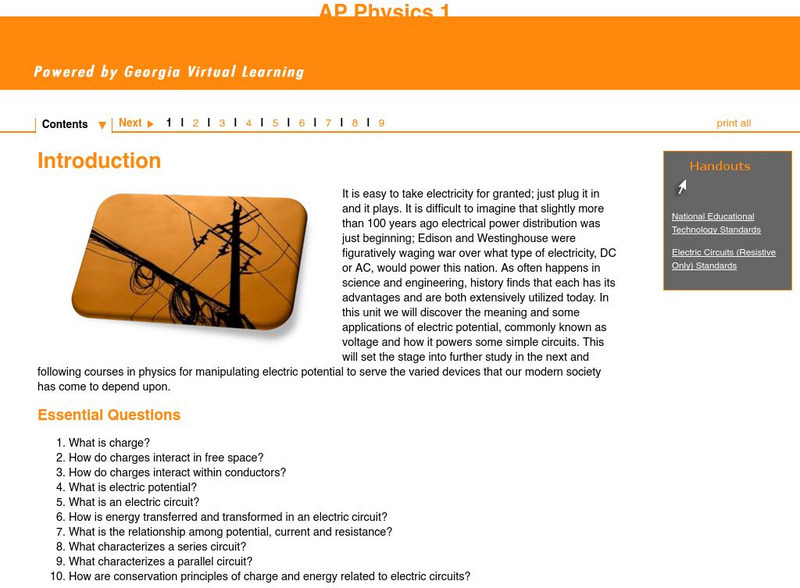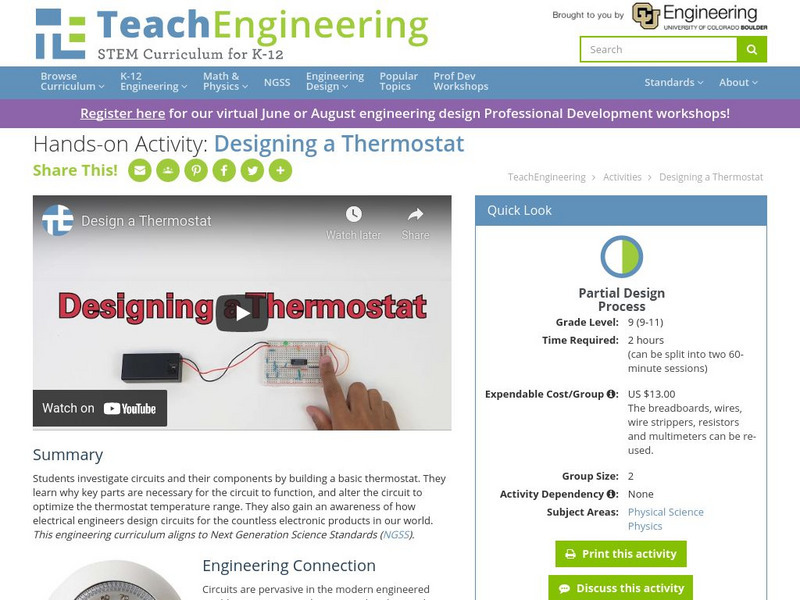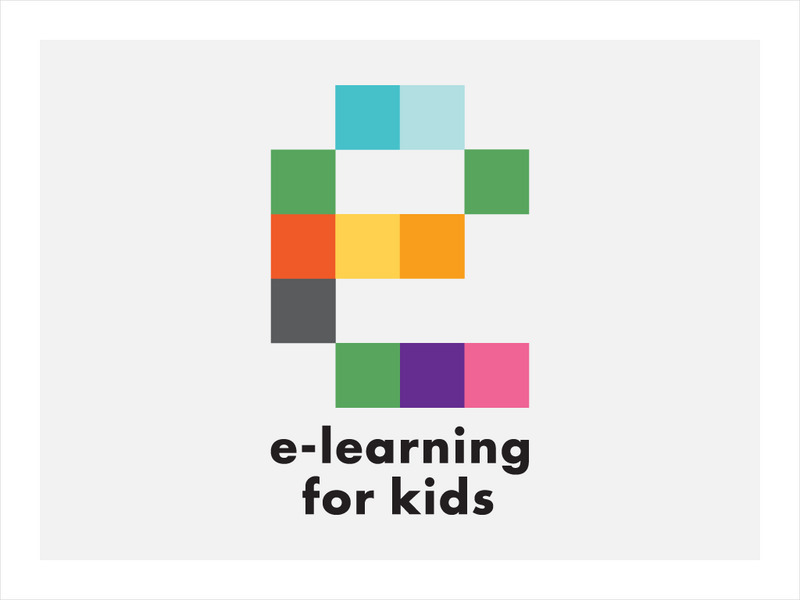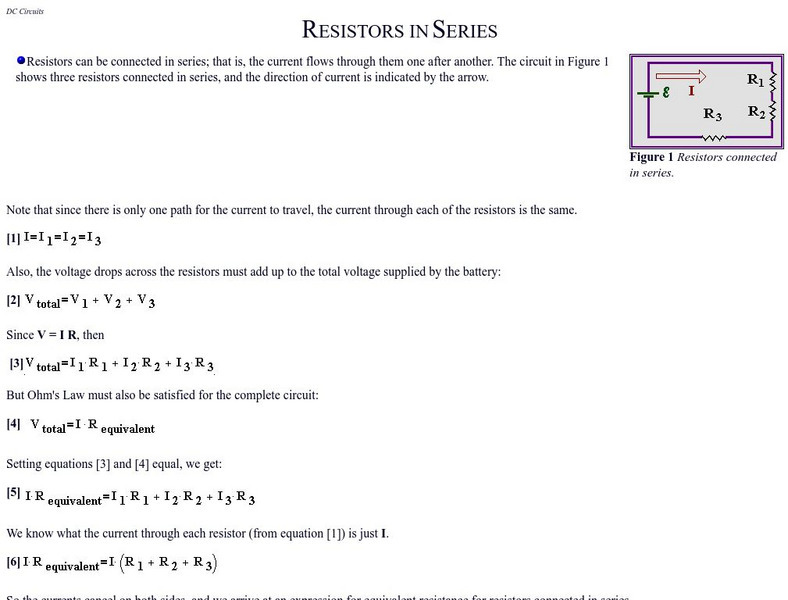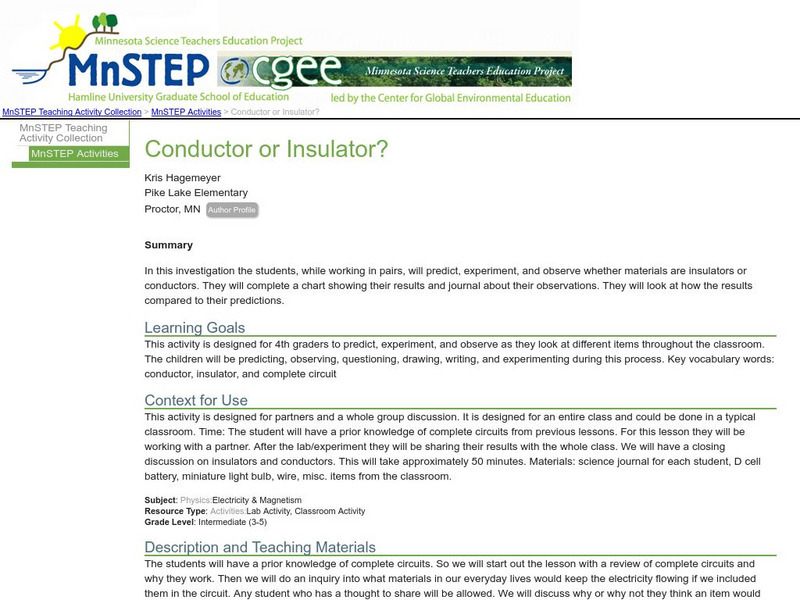Hi, what do you want to do?
University of Colorado
University of Colorado: Ph Et Interactive Simulations: Ohm's Law
An interactive simulation that teaches about Ohm's Law, circuits, and current by observing how adjusting the voltage and resistance changes current according to Ohm's Law. This simulation can either be downloaded or played online and...
University of Colorado
University of Colorado: Ph Et Interactive Simulations: Resistance in a Wire
An interactive simulation that teaches about resistivity, resistance, and circuits by observing how changes in resistivity, length, and area affect resistance in a wire. This simulation can either be downloaded or played online and...
PBS
Pbs: Chief Joseph
This PBS-People in the West site provides an excellent biography of the great Native American leader, Chief Joseph. The site includes a photo and his famous surrender speech.
Science Buddies
Science Buddies: How Blue Is Your Sports Drink?
Do you read the list of ingredients in foods and drinks before you buy them at the grocery store? If you do, you may have noticed that many of the items that are blue in color have the same dye, called FD&C blue 1. In this chemistry...
Canada Science and Technology Museum
Canada Science and Technology Museum: Background Information for Electricity
The Canada Science and Technology Museum answers some of the most common questions about electricity. For example, get the definition of electricity, the difference between alternating and direct currents, and learn how a fuse works.
Georgia Department of Education
Ga Virtual Learning: Ap Physics 1: Electric Circuits
In this unit students discover the meaning and some applications of electric potential, commonly known as voltage, and how it powers some simple circuits.
Georgia Department of Education
Ga Virtual Learning: Currents, Resistors, and Power
In this interactive tutorial students will learn about electric current, resistance and current density. Learn how current density relates to electric field strength and how resistance produces heat.
TeachEngineering
Teach Engineering: Designing a Thermostat
Students investigate circuits and their components by building a basic thermostat. They learn why key parts are necessary for the circuit to function, and alter the circuit to optimize the thermostat temperature range. They also gain an...
TeachEngineering
Teach Engineering: Sliding Textbooks
In this culminating activity of the unit which highlights how forces play a role in engineering design and material choices, students explore and apply their knowledge of forces, friction, acceleration, and gravity in a two-part experiment.
Science Buddies
Science Buddies: Put Some Energy Into It! Use a Calorimeter to Measure
In this science fair project, use a calorimeter with an attached heating element to measure how water responds to added thermal energy.
Physics Classroom
The Physics Classroom: Current Electricity
Four complete lessons on current electricity in the study of physics. Lessons include informational text, interactive activities, animations, and quick, interactive comprehension checks.
Science Struck
Science Struck: A Comprehensive List of All the Physics Formulas
Provides a long list of physics formulas for easy reference.
CK-12 Foundation
Ck 12: Parallel Circuits
[Free Registration/Login may be required to access all resource tools.] In this module, students learn what a parallel circuit is and how it differs from a series circuit.
Massachusetts Institute of Technology
Mit: Open Course Ware: Current, Resistance, and Power
Learners investigate current, resistance, and power. Some topics explored in the activities are Ohm's law, electrical power, and solving circuits. The resource consists of video clips, lecture notes, online textbook chapters, exam...
Georgia State University
Georgia State University: Hyper Physics: Ac Circuits
A very comprehensive site organized well with many topics dealing with AC circuits.
Boston University
Elementary Physics: Current and Resistance
A general summary of electrical resistance including a comparison of AC and DC current.
Georgia State University
Georgia State University: Hyper Physics: Ohm's Law and Current Law
At this site from Georgia State University Ohm's law is stated in words and using equations. A JavaScript form allows for multiple practice problems with instant feedback and reinforcement. Kirchoff's current law is stated and...
E-learning for Kids
E Learning for Kids: Science: Arctic Ocean: What Are Conductors and Insulators?
Visit Vlad and learn about the properties of conductors and insulators, and what materials are used for them.
National Endowment for the Humanities
Neh: Edsit Ement: Voices of the American Revolution
In this lesson plan, students will consider "Voices of the American Revolution." The plan includes worksheets and other student materials that can be found under the resource tab.
University of Guelph
University of Guelph: Physics Tutorials: Dc Circuits: Resistors in Series
Explains and illustrates the meaning of series connections. Discusses the voltage-current-resistance relationships for series connections of resistors. An example problem on series calculations can be accessed from this page.
University of Guelph
University of Guelph: Physics Tutorials: Dc Circuits: Resistors in Parallel
Explains and illustrates the meaning of parallel connections. Discusses the voltage-current-resistance relationships for parallel connections of resistors. An example problem on parallel calculations can be accessed from this page.
Science and Mathematics Initiative for Learning Enhancement (SMILE)
Smile: Electron Current Flow
A teacher lesson plan which could be easily converted into an idea for a student project or presentation. This page describes an activity in which the water-electricity analogy is used to investigate the relationship between current,...
Science Education Resource Center at Carleton College
Serc: Lighting the Way: Electrical Circuits and Lamp Wiring
Through a series of self-guided activities, students will explore basic electrical circuits and then build a working model of a circuit through the process of wiring a lamp. They will understand the flow of electrons through a circuit,...
Science Education Resource Center at Carleton College
Serc: Conductor or Insulator?
In this investigation the students predict, experiment, and observe whether materials are insulators or conductors.










